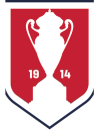His Independence side from last year, who reached our Round of 16 before losing out to MLS powers and 2019 Open Cup Champions Atlanta United, pulled off a huge Cupset over Rhode Island FC via penalty shootout in the Third Round. In the 12 months since then, he’s lost the services of one-time Manchester United winger Gabriel Obertan and the former Olympian (with Honduras at the Tokyo 2020 Games) Juan Carlos Obregon, who moved on to fellow USL League One Side Westchester SC.
That’s just how it goes. The cookie crumbles and you keep on keeping on. Always forward. Now Jeffries is leaning on the efforts and talents of Rafael Jauregui, just 20, who bagged a pair of goals in the First Round after arriving from USL Championship side Sacramento Republic in the off-season. Also in the mix is new arrival Jon Bakero, fresh from his stint with Memphis 901 in the USL Championship. He’s the son of former Barcelona and Spain National Team star Jose Mari Bakero.
Jeffries, the steady hand on the tiller in his 11th year with the club, is nothing if not ready to improvise.
And all this in a year when Charlotte’s other pro soccer team, Charlotte FC of Major League Soccer, will be taking part in the Open Cup. The crosstown top-tier outfit will join the competition in the Round of 32. And there’s no doubt that Jeffries and his charges will be eager to survive long enough to welcome Wilfried Zaha and Co to the Open Cup party.
“You always have to be ready to battle in the Open Cup – to fight all the way every time, no matter who you have in the side,” said Jeffries, who’s seen American soccer fall and rise again – and who knows, better than anyone perhaps, that nothing is over until it’s over. “Just because a team is from a higher league, or has a reputation, doesn’t give them the right to walk away with a win without working for it.”
Fontela is editor-in-chief of ussoccer.com/us-open-cup. Follow him at @jonahfontela on X/Twitter.
















